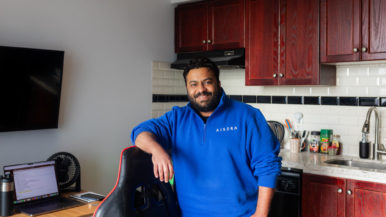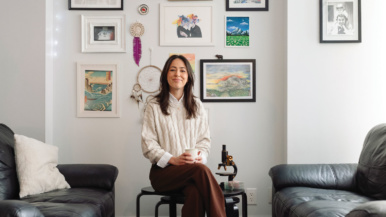I’m 24, I make $140,000 a year and I own two homes. I don’t regret a thing

In 2012, I was 20 years old and studying orchestral percussion at York University. I’d been in the program for two years, and it was time to take the next step: I had applied to Juilliard and was preparing for my audition. Playing orchestral arrangements takes a certain degree of technical accomplishment, but it’s mostly about soul.
At the time, my brother, an elevator technician, had put me in touch with someone who had a lead on a job in the business. I’d applied, not really believing I’d ever get it. It’s a great trade, with high earning potential. You can arrange to work a lot of extra hours, and that’s where the money really kicks in. My brother went into it right out of school, so I’d had a few years to see how much fun he was having. He was making good money and working hard.
That Christmas, I went home to visit my family. One day, my dad walked into the kitchen. He had this look on his face. You know, the one where you just think, “Uh-oh, what did I do? What’s wrong?” Dad said, “Okay, Matthew. Sit down. I have some information for you. I know this may be hard to decide, but I got a message for you about that job: it’s yours if you want to have it.” I was like, Oh shit.
I agonized over the decision. I knew that if I were to continue music for the next couple years, I’d be broke. I’d rack up thousands of dollars in debt—the tuition alone at Juillard is nearly $40,000—and I wouldn’t even be able to practice the drums. The school made it easier to rent my orchestral instruments, and I probably wouldn’t be able to buy my own once I left.
I also considered the job market: there aren’t a lot of positions out there for orchestral drummers. In the Toronto Symphony Orchestra, for example, there’s a principal, a backup, maybe, and that’s it. Once you’re in, you’re there for 30 or 40 years. There are a lot of percussionists competing for those spots, and I figured my chances were slim.
Two weeks later, I made my decision. I decided to skip my audition for Juilliard. I called it quits.

I started as an apprentice elevator technician, making $14 an hour. You have to put a lot of hours before you start making real money. My first year, I lived like any other 20-year-old. I was drinking and going out all the time. I was part of a core group of four guys, and we’d party a few times a week. We were just blowing money—almost all of us still lived with our parents at that point. When my brother bought a house in Scarborough, it became the party zone. Then we started going out downtown, and things got expensive. We went drinking at the Ritz once or twice, but nothing too crazy. There were only a couple of special nights where we dropped more than $1,000. Alcohol is expensive.
That lifestyle got old after about a year, and I started picking up books about financial planning. I read The Wealthy Barber, by David Chilton, in a day. After that, I made budget sheets and kept track of how much money I was spending. I was spending 80 to 90 per cent of my income on going out. Once I started seeing how much money I was throwing away, I was like, “Holy crap.” I reined it in, and started spending time jamming with my band instead of going out. I brought lunch to work and counted every dollar.
I decided that instead of spending all my money, I should invest it. I was determined to buy a house. I get my real estate sense from my parents. They own four properties, including our family home in Ajax. Once I had some money saved, I started looking at properties. I looked at maybe 15 houses before I found the one. It was 3,000 square feet, on a half-acre lot in Oshawa, with a big wrap-around porch. I fell in love with the gorgeous kitchen, which had a huge island, wall-to-wall cabinets and a gas range. In 2014, just after my 22nd birthday, I closed on the house for $340,000, and put five per cent down.
After I’d moved in, a friend needed a place to stay, so I rented a room to him for $500 a month. He’s like a brother to me, so it wasn’t about making an income from his rent. But living with him made me realize that having roommates wasn’t so bad. Eight months later, I decided to renovate the basement into another rental unit. I put about $15,000 into the overhaul, moved into the basement and leased the two bedrooms upstairs to cover the reno costs. The two tenants upstairs were girls in their 20s, just a little younger than I was at the time. When I met their parents, there were big question marks on their faces, as if to say, “This is your landlord?”
The tenants who live there now pay $1,800 a month all in, which covers my mortgage and the taxes on the property. In total, I’ve invested $355,000 in the house. The market moves fast, so I believe it’s better to put five per cent down while you’re young instead of saving for 10 per cent. I’m glad I decided to grow equity instead of just putting money in the bank.”
Not that I have anything against saving. I tend to put about $2,000 a month away. I usually work around 60 hours a week, including on-call, but some weeks I can get it up to 70. I’m making around $50 an hour these days—more with overtime. My income fluctuates a bit, but as it stands I’m on track to make about $140,000 this year.
Next month I’ll be turning 25. I just bought my second property—I moved into a condo on the Esplanade two weeks ago. The place was $474,000, for about 600 square feet, about the size of the kitchen in my house in Oshawa. I wanted to buy a house in Toronto, because the condo market moves so slowly, but I love the neighbourhood, and my brother lives in the same building. I figure I’m gaining a few hours off my life back every day by not having to commute downtown for work, especially given that I work on-call so much. And I want to buy another property before I turn 27. Then, when I’m 30 or so and ready to have kids, I can move out of Toronto and have a huge home for my family.





